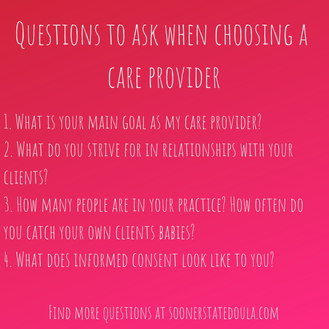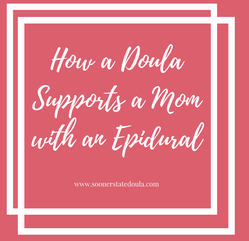|
Choosing a good care provider and birthing location are two of the most important decisions you will make during your pregnancy. Having a supportive medical provider and a birthing location that follows up to date practices will stack the deck in your favor for a positive birthing experience.
A few weeks ago I was getting my hair done at a new hairdresser. She asked what I do for work and I said I was a birth doula. After I said this, I expected the question that is usually asked next. "Whats that?" Instead, I was pleasantly surprised when she said "Oh I know what that is!"
However as we continued talking I realized she was mistaking a doula for a midwife. This is a very common misunderstanding. Doulas and midwives have vastly different roles, but because most women use an OB for medical care, these roles can sometimes become confusing. “It's time for a vaginal check.” “I would like to break your water” “Let's schedule your induction.” What do these three phrases have in common? These are all things you might hear from the medical staff during your pregnancy or birth, but all three are missing something of critical importance. CONSENT! These three phrases are worded in such a way that consent is not asked for at all, in fact all three imply that consent has already been given. I've unfortunately been the victim of, and witnessed medical staff talk to women in a way that implies that consent has already been given, when proper informed consent was never actually given at all. What is most shocking to me is how often women undergo treatment, unaware that their fundamental right to informed consent has been violated. So what is informed consent?
Informed consent is not an abstract idea but it is a legal precedent that has been clearly defined. By law, “A care provider must not provide health care without an adult's consent”. Informed consent practices require your health practitioner to provide the following:
Now lets take a second look at the three phrases that I started this post with. When these statements are made to a woman, it gives her the impression that there is no option, no permission to say no. I've noticed that medical staff choose these words very intentionally, and carefully in order to maintain cooperation within their patients. It's important for birthing women to be aware of this and watch out for it. Why is informed consent important? First and foremost, the idea of informed consent is rooted in the dignity and respect of the patient. Informed consent recognizes the basic human right to have autonomy over your own body, as well as parental rights to the healthcare of your children. Birth is an occasion you will remember for the rest of your life, and each pregnancy only has one opportunity to make this memory a good or a bad one. The decisions made during birth will have a lasting effect, not only on the mothers memories but also on the life and well being of herself, her baby, and her entire family. With the Women's March taking place just a few days ago, and the #metoo movement still trending on social media, sexual abuse is being talked about much more frequently than ever before. One out of every six women is a victim of sexual abuse, and this abuse has lasting effects. For these women, feeling out of control or unable to say no can be a huge trigger. Yet, many do not understand how this can carry over into the birthing space. Lets think about this.. You have a woman, often being cared for by nurses and doctors they have just met, and those medical professionals are not freely giving them the option to say no. Sometimes this happens even when the interventions proposed are involving the most intimate areas of women's bodies, such as vaginal exams. When you think it through, it is easy to imagine how horrific this could make an abuse survivor feel. I don't believe doctors or nurses do this on purpose. I'm sure things like cervical checks just become routine, and they are unaware of how their actions can make victims feel. However, we need to consider how our words (intentional or not) could affect women, especially victims, during childbearing and birth. Our words matter. Consent matters. How do I acquire informed consent? The first step for acquiring informed consent during birth starts when choosing a medical provider and a birthing location. Make sure your birth team knows how important it is to you to play a leading role in your healthcare decisions. Understanding informed consent gives you a leg up in receiving the care and birth you want. Make it a priority to choose a health practitioner who also values your role in making decisions. Secondly, taking a birth class may help you to better prepare for the procedures and interventions that may be proposed during birth. Most birth classes will cover the basic benefits, risks, and alternatives for commonly suggested interventions. Thirdly, it is important that you are ready to ask the right questions when an intervention is proposed. Remember the acronym BRAIN B- Benefits- What are the benefits to this procedure? R- Risks- What are the risks to this procedure? A- Alternatives- What are the alternatives to this procedure? I- Instinct – What is my instincts telling me? N- Nothing- What would happen if I do nothing or revisit this procedure at a later time? By taking a minute to ask the nurse or doctor these questions you are taking the ability to gain informed consent back into your own hands. Another tip I always suggest to parents is to ask for a moment to discuss the procedure in private after they have asked the necessary questions. For those parents hiring a doula, you should be aware that a doula should never speak on your behalf. However, they can help you to obtain informed consent by reminding you to use the BRAIN acronym, informing you of risks, benefits, and alternatives, and empowering you to speak up about your thoughts and feelings on procedures being proposed. Doula's are a great way to ensure you receive proper informed consent about your birthing choices. Informed consent is a cornerstone of good medical care. It builds trust between patients and physicians, it empowers parents, and it is a legal right to all. However, oftentimes it's importance is ignored. It's time for mothers and parents everywhere to share their experiences (good and bad), and to take informed consent into their own hands. As consumers, we can influence the degree of consent by the questions we ask, the research we do, and by the voices we have. Hiring your medical staff wisely, educating yourself, asking the right questions, and surrounding yourself with support will help to ensure you are given proper informed consent during pregnancy, birth, and parenting. It is a common misconception that doulas only work with parents planning an unmedicated birth. This could not be farther from the truth! For parents planning on using an epidural, a doula can still support the family is a number of ways...
In honor of the first day of world doula week, here is a small sampling of some of the families I am honored to have supported! Each family imparts something special and teaches me something new. I'm continually amazed at how unique each birth is. I love what I do. #doulasbenefiteveryone Happy world doula week! Please leave me a comment telling me how your doula was a benefit to your family. I cant wait to hear!
There really is no right or wrong when it comes to your labor playlist. Listen to whatever makes you happy! Most moms seem to perfer a slower soundtrack during active labor, but in early labor many moms like to get up and dance. Music apps like Spotify and Pandora have even released birthing playlists that feature curated music for laboring moms. If you perfer to make your own soundtrack, here are a few song suggestions to get you started.
Birth affirmations are a powerful tool used during labor. Positive words can help you maintain mindfulness during your pregnancy and seeing those affirmations during labor help to ground you and keep you in control. If you are interested in using birth affirmations during your birth, check out these birth affirmations from around the web. Some contain scriptures, some are geared for natural birth, some are geared for everyday life. Whatever kind of affirmations you are looking for, these should satisfy your need!
Printable Scripture Cards Tricking the Mind: 20 Printable Mantras to Get Through a Natural, Unmedicated Childbirth 8 Free Printable Birth Affirmations Affirmations and Becoming Your Own Cheerleader Free Printable Credit Card Size Positive Affirmations Inspirational Printable Quotes Brave Quote Printable 40 Birth Affirmations Cards 11 Printable Birth Affirmations Pretty Printable Birth Affirmations Neutral Birth Affirmations A whopping 80%-90% of women experience some degree of morning sickness. I experienced it with both my children. With one of my pregnancies I suffered through Hyperemesis Gravidarum, AKA the nausea from hell. If you are like the majority of women who are experiencing morning sickness, here are a few survival tips.
|
Miranda JonesMiranda is a birth and postpartum doula serving the central Oklahoma area. Archives
January 2020
Categories
All
|
Proudly powered by Weebly









 RSS Feed
RSS Feed